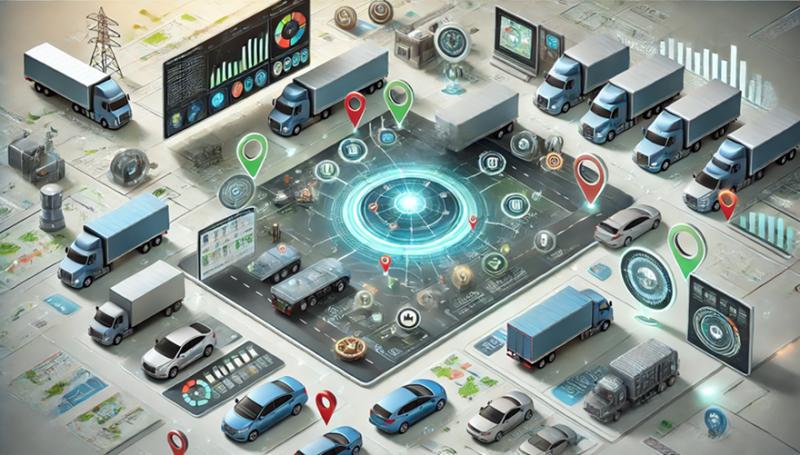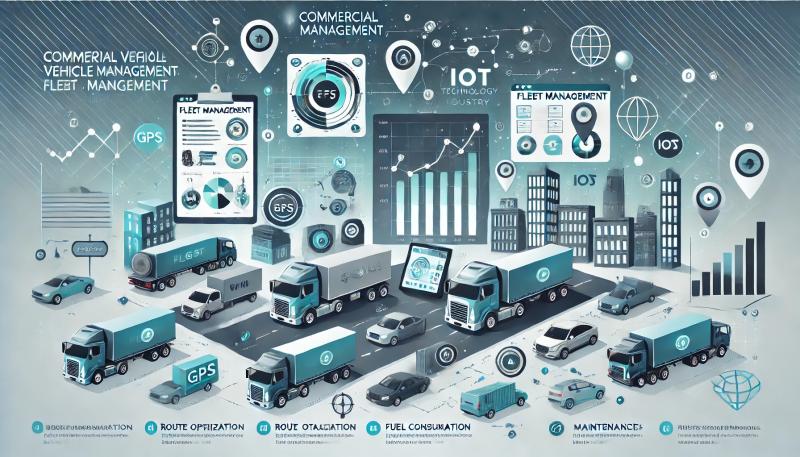Boosting Efficiency and Safety: Role of Global Tracking Devices Market for

The global tracking devices market for commercial vehicle fleet management is expanding rapidly as companies recognize the importance of optimizing fleet operations and ensuring driver safety. In today's competitive business landscape, managing a fleet of vehicles efficiently is crucial for reducing costs, improving productivity, and maintaining safety standards. Tracking devices, powered by advanced GPS and telematics technologies, are becoming indispensable tools for fleet managers across industries such as logistics, transportation, and delivery services.
What is Commercial Vehicle Fleet Management?
"Commercial Vehicle Fleet Management" refers to the coordination, operation, and monitoring of a company's vehicles, which are used for business purposes. Fleet managers are responsible for maintaining vehicles, monitoring driver behavior, optimizing routes, and ensuring compliance with regulations. Efficient fleet management can reduce operational costs, improve vehicle utilization, and enhance customer service.
Role of the Tracking Devices Market for Commercial Vehicle Fleet Management
According to BIS Research, the global tracking devices market for commercial vehicle fleet management is projected to reach $6.92 billion by 2032 from $3.49 billion in 2023, growing at a CAGR of 7.59% during the forecast period of 2023-2032.
The growing demand for advanced fleet management solutions has led to the rapid expansion of the tracking devices market for commercial vehicle fleet management. These devices use GPS (Global Positioning System), telematics, and IoT (Internet of Things) technologies to provide real-time data about vehicle location, performance, and driver behavior.
Here are some of the key roles tracking devices play in enhancing fleet management:
Real-Time Vehicle Tracking:
Tracking devices provide fleet managers with real-time vehicle location visibility.
Optimizes routes, reduces fuel consumption, and improves delivery times.
Enables quick responses to traffic or route changes, enhancing operational flexibility.
Improved Fleet Efficiency:
Tracking devices offer data on vehicle usage, fuel consumption, and idle times.
Helps managers reduce unnecessary stops, optimize routes, and schedule preventive maintenance.
Improves vehicle performance and reduces operational costs.
Enhanced Driver Safety:
Monitoring driver behavior (speeding, harsh braking, etc.) improves safety.
Alerts managers to unsafe practices, enabling feedback or training to reduce accident risks.
Real-time tracking ensures quicker emergency responses, protecting drivers and cargo.
Route Optimization:
Analyzes traffic patterns and road conditions to optimize routes.
Reduces fuel consumption and operational costs while increasing daily deliveries.
Enhances profitability and customer satisfaction in competitive industries like logistics.
Regulatory Compliance:
Detailed reports on vehicle usage and driver behavior ensure regulatory compliance.
Helps avoid fines and enhances the company’s reputation for responsible fleet management.
Theft Prevention and Asset Security:
Real-time location updates help recover stolen vehicles or assets.
Geofencing alerts managers when vehicles move outside designated areas, enhancing security.
Global Market Segmentation
Segmentation by Application:
Food and Beverage
Grocery
Agriculture
Construction
Transportation
Logistics
Pharmaceutical
Segmentation by Region:
North America
Europe
Asia-Pacific
Middle East
Africa
Latin America
Future Trends in the Tracking Devices Market
The global tracking devices industry for commercial vehicle fleet management is expected to continue growing, driven by advancements in technology and increasing demand for efficient fleet operations. Here are some of the future trends that will shape the market:
Integration with AI and Machine Learning:
AI-equipped tracking devices analyze real-time data on vehicle performance, driver behavior, and maintenance needs.
Predictive analytics help forecast vehicle breakdowns, allowing for timely maintenance and minimizing downtime.
5G Connectivity:
5G networks will enhance the precision of tracking devices with faster data transmission and reliable connections.
Real-time updates will enable better route optimization, monitoring, and communication between fleet managers and drivers.
Get more insights on the Automotive Market Research Reports.
Increased Adoption of IoT Devices:
IoT-enabled tracking devices connect with vehicle sensors, providing insights on cargo conditions, tire pressure, and vehicle health.
This integration allows for more comprehensive and efficient fleet management solutions.
Electric Vehicle Fleet Management:
Tracking devices will monitor electric vehicle (EV) performance, battery health, and charging schedules.
They will help manage EV fleets by optimizing routes, reducing charging times, and tracking energy consumption.
Conclusion
The global tracking devices industry for commercial vehicle fleet management is revolutionizing the way businesses manage their fleets. By providing real-time data on vehicle location, performance, and driver behavior, tracking devices help businesses improve efficiency, reduce operational costs, and enhance safety. As technology continues to evolve, the role of tracking devices in fleet management will only become more critical, offering even more advanced features for optimizing fleet operations.
For businesses looking to stay competitive, investing in tracking devices is no longer an option—it’s a necessity. With advancements in AI, IoT, and 5G on the horizon, the future of fleet management will be more data-driven, efficient, and safer than ever before.









Comments